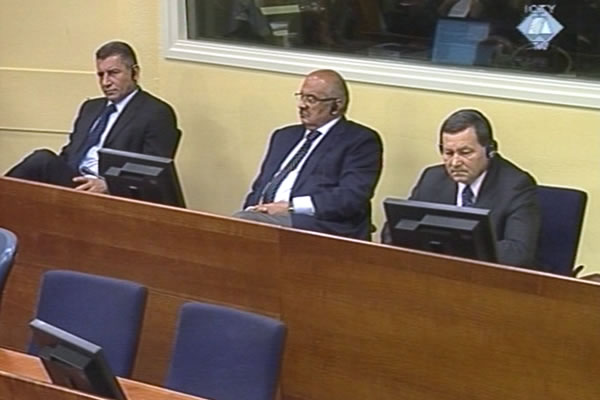Home
AMERICAN EXPERTS: ‘REJECT THE FINDINGS OF UNLAWFUL ARTILLERY ATTACKS ON KRAJINA’
Twelve military experts, including an expert of General Ante Gotovina’s defense, have urged the Tribunal’s Appeals Chamber to reject the findings in the Trial Chamber’s judgment of the unlawful artillery attacks on civilians in the Krajina towns during Operation Storm. The experts have recalled the significance of the appellate judgment for the development of international humanitarian law
 Ante Gotovina, Ivan Cermak and Mladen Markac in the courtroom
Ante Gotovina, Ivan Cermak and Mladen Markac in the courtroom In the capacity of ‘Amicus Curiae", a group of military experts has today submitted a motion to the Appeals Chamber in the case of Croatian generals Ante Gotovina and Mladen Markac. The group urges the Appeals Chamber to ‘reconsider and reject’ the findings in the Trial Chamber’s judgment on the unlawful artillery attack on civilians in Knin and other Krajina towns during Operation Storm in early August 1995. Twelve persons who ‘share interest and expertise in the relationship between military operational practice and international humanitarian law’ have signed the motion to the Appeals Chamber. Most of them are Americans; Geoffrey Corn, who testified as a military expert in Ante Gotovina’s defense, is among them.
On 15 April 2011, the Trial Chamber sentenced generals Ante Gotovina and Mladen Markac to 24 and 18 years in prison respectively for their part in the joint criminal enterprise aimed at eliminating Serbs from Krajina. The judgment found that the artillery attacks on Knin, Obrovac, Benkovac and Gracac were indiscriminate and unlawful because they targeted civilians and not the Krajina army. The indiscriminate attack was only one of the elements of the joint criminal enterprise headed by Croatian president Franjo Tudjman, the judgment concluded.
In the general introduction to the motion, "Amicus Curiae" warn the Appeals Chamber that the final judgment in the case against the Croatian generals vis-a-vis the artillery attack will substantially affect the future application of international humanitarian law in armed conflicts. Also, the motion cautions that ‘no operational commander can guarantee absolutely perfect execution of even the most legally compliant targeting plan".
The Amici state they are ‘concerned’ by the Trial Chamber's decision to consider all shells that fell more than 200 meters away from military targets in Krajina towns as a part of a deliberate attack on civilian targets. The 200-meter limit has never been established in military practice, and that is the standard, the signatories claim, that is "inconsistent with operational reality". Even if such a limit were accepted in the appellate judgment, the judgment established that only 4 % of the shells did not hit military targets, the military experts note. In their view, this is no evidence that Gotovina intended to target civilians. The Trial Chamber in its judgment said that the exact place of impact was established only for a smaller number of shells that fell on Knin on 4 and 5 August 1995. Of that percent, a ‘large quantity of shells hit civilian targets’.
The only specific example in the twelve experts' motion is the artillery attack launched by the Croatian Army on the apartment of the Krajina Serb president Milan Martic. The Trial Chamber’s judgment described the attack as disproportionate. The commander of Operation Storm, Ante Gotovina, had the right to launch the attack in order to reduce the president’s ability to influence military decisions, the experts contend. Gotovina "took great care’ to avoid civilian casualties although he could "reasonably believe" that "most of the civilians had left the residential area in the vicinity of the Martic apartment".
The motion was filed in line with the Tribunal’s rule allowing every country, organization or individual, acting as ‘a friend of the court’ to submit their opinions to the Tribunal, solicited or unsolicited. The defense and the prosecution have the right to reply.
Linked Reports
- Case : Gotovina et al. - "Operation Storm"
- 2011-12-05 GOTOVINA SEEKS ‘ARTILLERY LOGS’ FROM UN
- 2011-10-03 DEFENSE REPLIES TO PRESECUTOR’S REPLY
- 2011-09-30 PROSECUTION: ‘CONFIRM GOTOVINA’S AND MARKAC’S SENTENCE’
- 2012-01-24 PROSECUTION URGES JUDGES TO REJECT AMERICAN EXPERTS’ BRIEF
- 2012-01-30 GOTOVINA’S DEFENSE: ‘ACCEPT ARGUMENTS OF AMERICAN EXPERTS’
- 2012-02-14 ‘AMICUS CURIAE’ BRIEF IN THE CASE OF CROATIAN GENERALS DENIED
